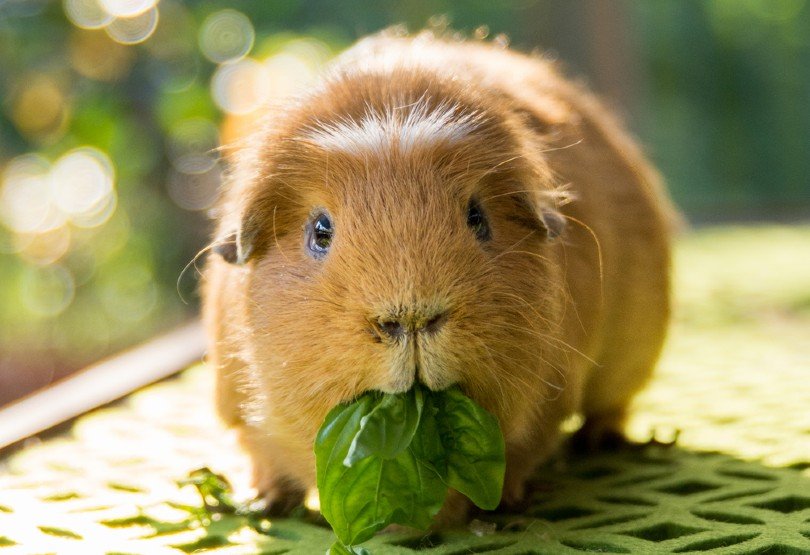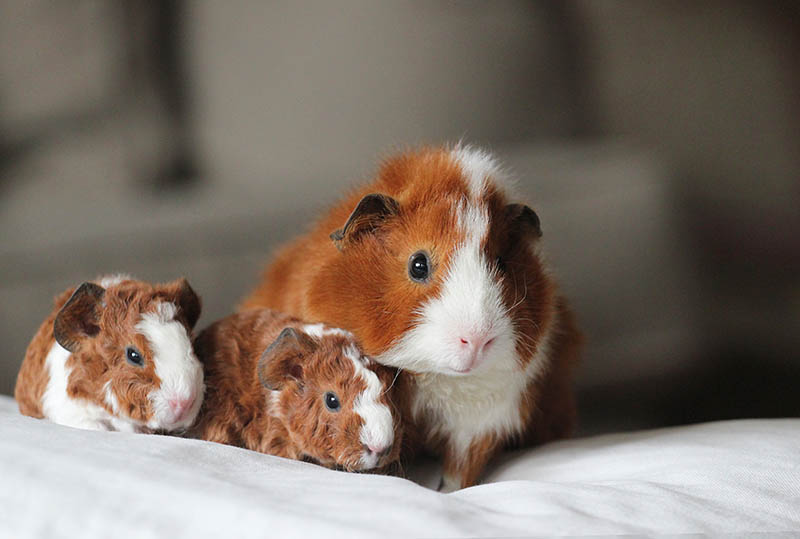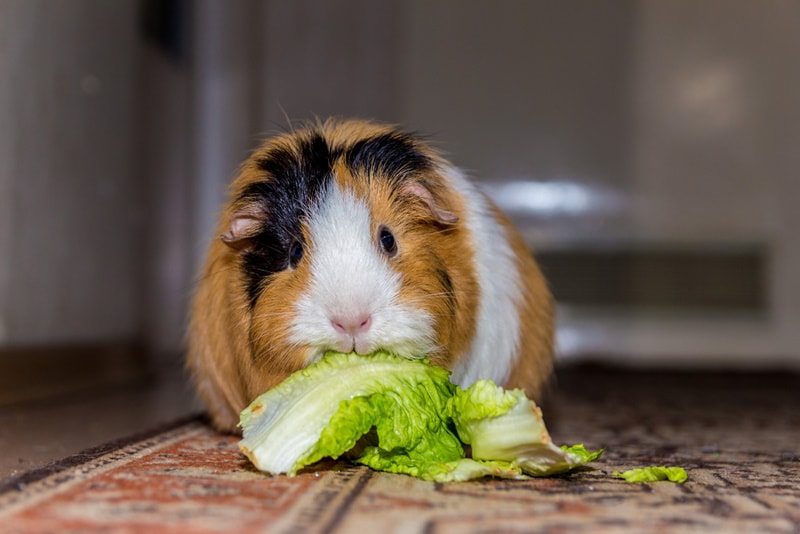Can Guinea Pigs Eat Basil? Vet-Approved Facts & FAQ
Updated on

Click to Skip Ahead
Yes! Guinea pigs can eat basil. Guinea pigs are herbivores, so whether it’s leafy greens, delicious fruits, or disease-fighting herbs, your guinea pig is safe.
Although basil is safe for your furry friend, it includes loads of calcium, which can harm your guinea pig’s health. So, how safe is basil, really? How much basil is too much? Let’s find out.
How Safe Is Basil for Guinea Pigs?
Basil is high in vitamin C and potassium. Your guinea pig must get an adequate amount of Vitamin C daily. Vitamin C is necessary for your guinea pigs’ development, healthy skin and nails, and strong joints. It also plays a role in preventing illness and healing wounds faster. However, too much of anything is not good, so be careful not to feed your guinea more than 50 milligrams per day.
Potassium, on the other hand, is also beneficial for guinea pigs. The amount of potassium safe for your guinea pig relies on the concentration of calcium and phosphorus in their diet. Simply put, unless your guinea pig has kidney or digestive issues, potassium is safe to consume.
Basil is one of the most essential herbs to feed your guinea pig to keep them happy and healthy. Basil has several vitamins, minerals, and antioxidants. Antioxidants are critical in helping your guinea fight colds and diseases.

How Much Basil Can Guinea Pigs Eat?
When introducing basil to your guinea, start slowly with a couple of leaves once a week, then increase weekly. It’s best to feed your guinea pig two basil leaves (with other vegetables and herbs) no more than three times a week.
Guinea pigs can enjoy the entire plant, including the stem, leaves, and flowers. Do not cook or boil basil. Always feed them fresh or raw basil.
When it comes to basil, moderation is key. Due to the calcium content in basil, high doses can damage your guinea’s health. Foods that are too high in calcium will lead to kidney stones and a hefty vet bill.
Nutritional Value of Basil
Basil has vitamins including A, K, D, and C. Together, these vitamins promote a healthy digestive system and cardiovascular health and aid in healing. Basil also includes fiber and antioxidants. Below is a list of basil’s nutritional values:
| Nutrients | Per 100 grams |
| Fiber
Vitamin A Vitamin C Potassium Calcium Protein Calories Magnesium Zinc Sugar |
1.6 g
264 mcg 18 mg = 30% 295 mg = 8% 177 mg = 17% 3.15 g 22 64 mg = 16% .81 mg .2 g |
Benefits of Basil for Your Guinea Pig
Basil’s high fiber and protein content will allow your guinea to stay active throughout the day. Zinc and Vitamin A are antioxidants that help combat illness and prevent disease. In contrast, the Vitamin C component in basil helps your guinea pig stay healthy and balanced throughout their life.
- Reduces inflammation
- Helps prevent scurvy (vitamin C deficiency)
- Boosts immunity
- Improves eyesight
What Other Herbs Are Safe for Guinea Pigs?
- Arugula
- Dandelion
- Clover
- Mint
- Parsley
- Cilantro
- Dill
- Fennel
- Oregano
- Thyme
Of course, giving your guinea all these herbs at once is not a good idea. However, if you will feed your guinea something new, make sure it’s fresh and in small doses at first.
Herbs must be provided alongside fruits and vegetables so that your guinea is offered a balanced diet.
What Herbs Are Unsafe for Guinea Pigs?
- Sage
- Marjoram
- Lavender
- Rosemary
- Yarrow
- Tarragon
- Chives
Tips for A Healthy Diet
The best thing you can do for your guinea pig is to ensure they get all the nutrients they need to stay healthy and active. A healthy diet includes a variety of fruits, herbs, and vegetables alongside hay and pellets.
Timothy hay is the best way to feed your furry friend, as it promotes digestion and limits teeth growth and decay. Ensure your guinea pig pellets are fortified with vitamin C since guinea pigs cannot create vitamin C alone.
Vegetables like bell peppers, lettuce, kale, and fresh greens can be included in your piggy’s diet daily. Carrots, sweet potatoes, and zucchini can be offered once or twice weekly.
Most fruits are high in vitamin C, which your guinea will thank you for. You can offer fruits such as apples, strawberries, blueberries, grapes, and oranges daily. Once or twice a week, you can offer melons, grapefruit, bananas, kiwi, mango, peaches, pears, and many more.
It’s best to provide your guinea pig with a combination of pellets, hay, fruits, herbs, and vegetables to help them stay balanced and healthy throughout the span of their lives.

Final Thoughts
When it comes down to it, having a happy guinea pig will fill the whole household with joy. Guinea pigs show happiness through verbal sounds and clear body language. Basil is one herb—given in small doses twice a week—that is safe to feed your tiny fur friend.
Featured Image Credit: kkolosov, Pixabay











